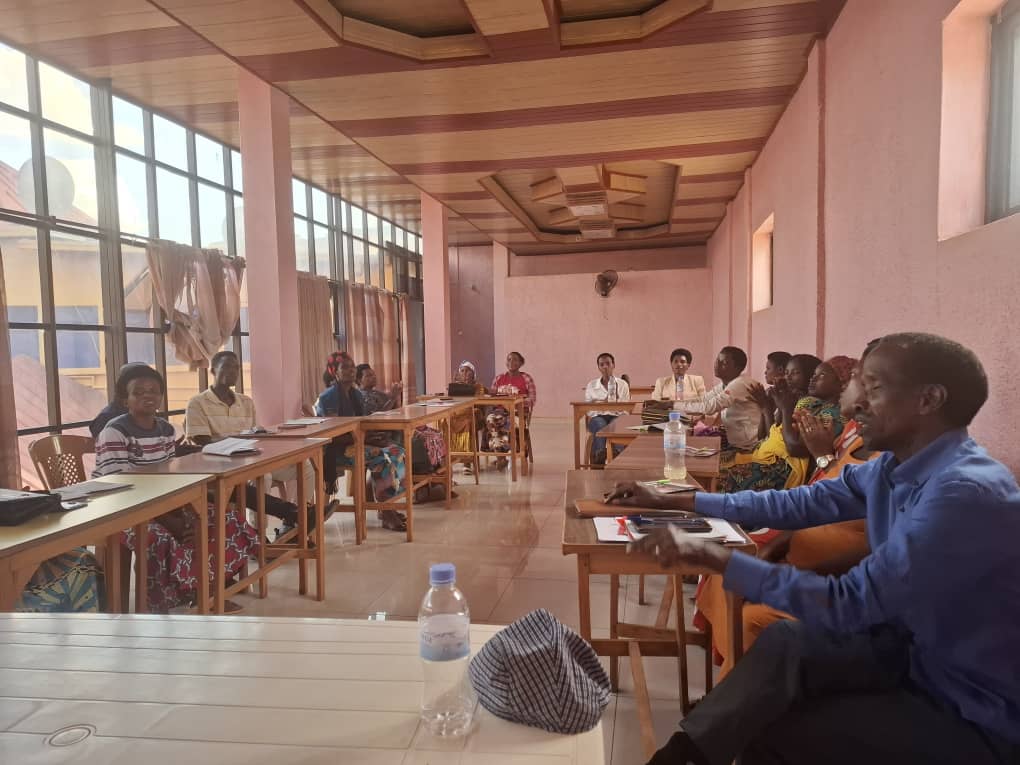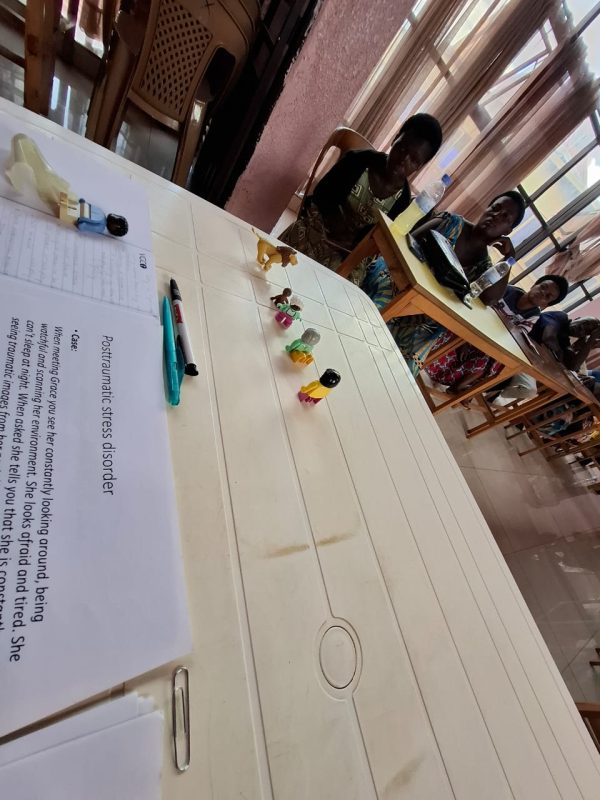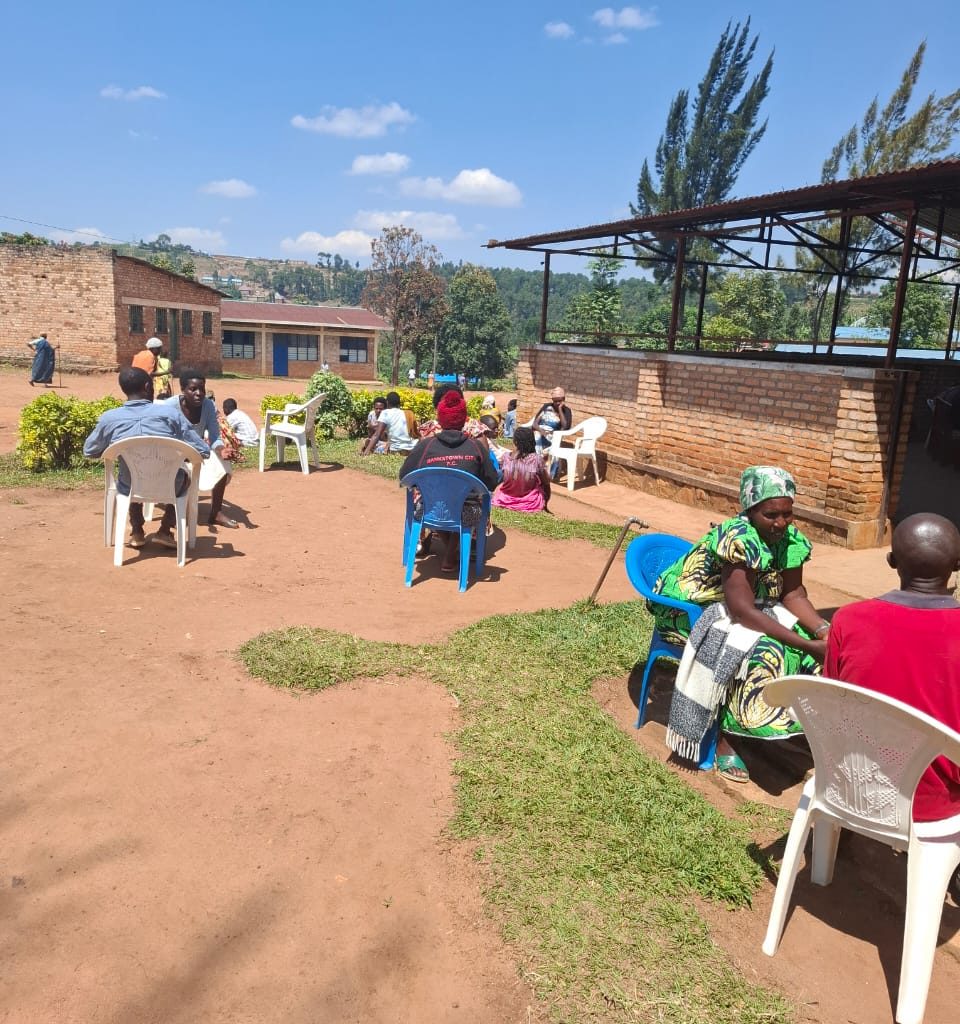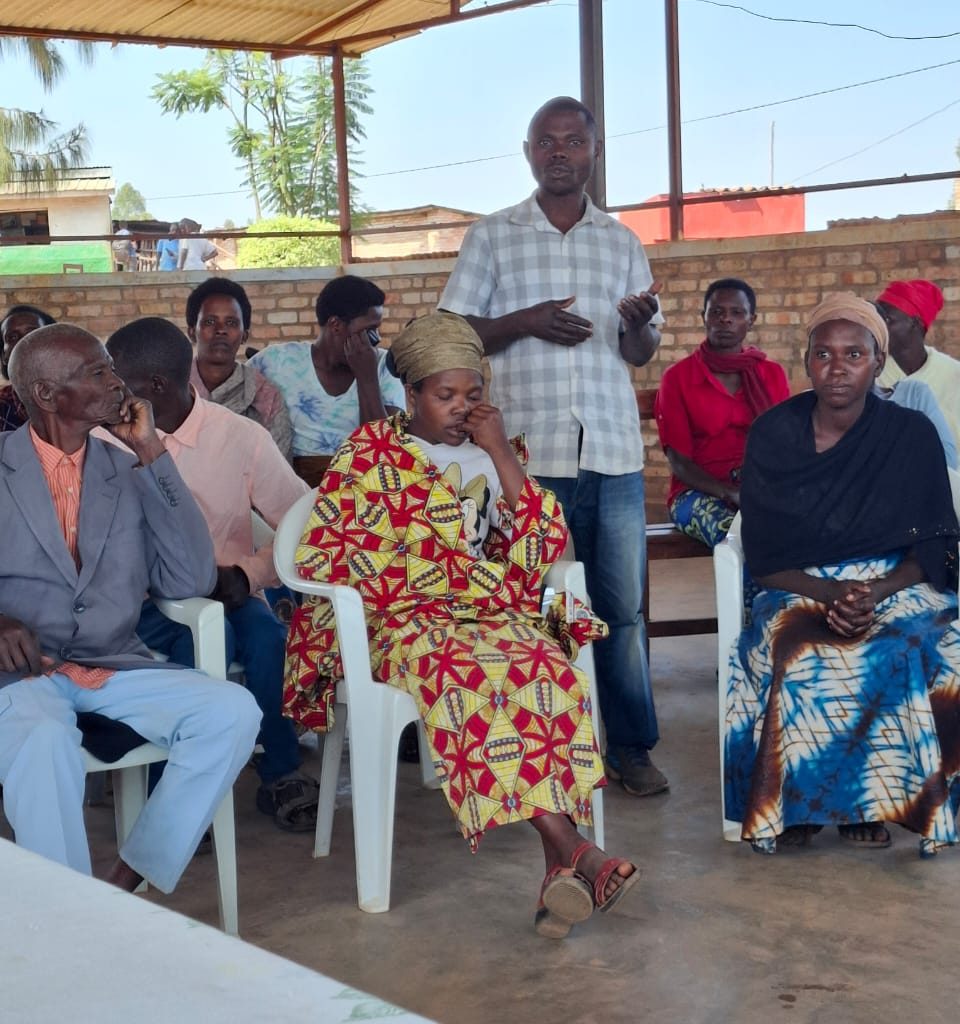
Overzicht
In juni 2025 faciliteerde A Cup for Humanity twee trainingen in ‘Community based trauma healing’ in Nyamata en Huye. Het belangrijkste doel was het versterken en herstellen van de individuele en de collectieve veerkracht om met trauma gerelateerde problemen (na de genocide) om te gaan.
Naast de training schonk A Cup for Humanity een naaimachine aan de Nyamata-gemeenschap. Deze bijdrage maakt deel uit van een bredere strategie om traumagenezing te integreren met economische empowerment door inkomensgenererende activiteiten te ondersteunen en daarmee de veerkracht van de gemeenschap te vergroten.
Training Details

Voorbereidingstijd: Enkele weken voorafgaand aan de evenementen werden de voorbereidende taken voltooid, waaronder materiaalvoorbereiding, coördinatie met lokale partners, logistieke regelingen, vergaderingen enz.
Deelnemers:
Nyamata: 20 deelnemers
Huye: 28 deelnemers
Duur:
Nyamata: 4 dagen
Huye: 1 dag
Onderwerpen
Actieve luistervaardigheden: Deelnemers maakten kennis met de principes en technieken van actief luisteren, met een focus op empathie, niet-oordelende aanwezigheid en aandacht. Door middel van begeleide oefeningen en rollenspellen leerden ze hoe ze een veilige en ondersteunende omgeving kunnen creëren voor het delen van traumatische ervaringen.

Posttraumatische stress
De sessie was bedoeld om het bewustzijn te vergroten, stigmatisering te verminderen en ondersteunende reacties te bevorderen. De deelnemers maakten kennis met de belangrijkste symptomen en effecten van posttraumatische stress, met bijzondere aandacht voor hoe het zich in het dagelijks leven voordoet. Ze reflecteerden op persoonlijke of waargenomen ervaringen binnen hun gemeenschap en bespraken copingstrategieën.
Inleiding tot narratieve exposure therapie
Deelnemers maakten kennis met de belangrijkste principes van Narratieve Exposure Therapie (NET), een therapeutische benadering die is ontworpen om individuen te helpen een samenhangend chronologisch levensverhaal op te bouwen om zowel traumatische gebeurtenissen te verwerken als weer toegang te krijgen tot goede levenservaringen. De sessie benadrukte de therapeutische waarde van verhalen vertellen bij traumaherstel en moedigde de deelnemers aan om na te denken over hoe persoonlijke en collectieve verhalen genezing en veerkracht kunnen ondersteunen.
Hoofdpijn verlichtende oefeningen
Deelnemers kregen te zien hoe ze eenvoudige massagetechnieken van nek, schouders en hoofd kunnen toepassen om spanning te verlichten en de frequentie en intensiteit van hoofdpijn te verminderen. Hoofdpijn werd als een veel voorkomende klacht benoemd. De sessie benadrukte ook het verband tussen stress, spierspanning en hoofdpijn, en gaf praktische richtlijnen over hoe deze zelfzorgoefeningen kunnen worden geïntegreerd in dagelijkse routines om ontspanning en algeheel welzijn te bevorderen.
Hydratatie bewustzijn
Omdat ontdekt werd dat kennis over dit onderwerp ontbrak werd de cruciale rol van het drinken van voldoende water uitgelegd. In het bijzonder het belang van het consumeren van ten minste drie liter schoon water per dag, wat zal helpen om de algehele gezondheid te behouden en terugkerende hoofdpijn te voorkomen.
Seksueel geweld en ondersteuning van overlevenden
Deze sessie was gericht op de fysieke en emotionele genezing van overlevenden van seksueel geweld, met bijzondere aandacht voor het natuurlijke vermogen van het lichaam om cellen in de loop van de tijd te vernieuwen en te regenereren. De sessie benadrukte dat hoewel trauma blijvende effecten kan hebben, het vermogen van het lichaam om te genezen kan dienen als een krachtige herinnering aan veerkracht en vernieuwing. De discussie ging ook over het belang van veilige ruimtes en waar toegang te vinden is tot zorg na seksueel geweld.
Methodologie

De workshops maakten gebruik van een dialoog bevorderende benadering, waarbij deelnemers worden aangemoedigd om persoonlijke en gemeenschappelijke traumatische ervaringen te delen in een veilige, ondersteunende ruimte.
Activiteiten waren onder andere:
- Life storytelling-sessies met visuele hulpmiddelen (bijv. het gebruik van poppetjes ter illustratie)
- Gebeden, zang en dans als vormen van expressie en emotionele ontlading
- Interactieve oefeningen om vertrouwen en veerkracht op te bouwen
- Praktische demonstraties van zelfzorgtechnieken
Deze benadering bevorderde zowel individuele genezing als collectieve solidariteit.

Getuigenis 1.
“Nadat ik vorig jaar de traumagenezingstraining had gevolgd, kon ik een vriend steunen die op het punt stond zelfmoord te plegen vanwege een ernstige huwelijkscrisis. Ze bereidde zich voor om het huis te verlaten met de bedoeling een einde aan haar leven te maken. Op basis van wat ik heb geleerd over Narratieve Exposure Therapie, heb ik haar voorzichtig begeleid om zich te concentreren op positieve herinneringen. Concreet moedigde ik haar aan om na te denken over bloemen die in haar levensverhaal symbool staan voor goede herinneringen. Deze eenvoudige maar krachtige oefening hielp haar focus af te leiden van wanhoop. Uiteindelijk koos ze ervoor om niet door te gaan met de zelfmoord. Vandaag is ze stabiel en blijft ze thuis en zet ze haar helende reis voort.”
Getuigenis 2.
“Dit is de eerste keer in mijn hele leven dat ik de kans heb gehad om te gaan zitten en echt door iemand te worden gehoord. Door de ervaring voel ik me diep gekend. Het heeft me een hernieuwd gevoel van hoop en een frisse kijk op het leven gegeven.”
Getuigenis 3
“Voordat ik de vorige training volgde, worstelde ik met depressie, eenzaamheid en een diep gevoel van wantrouwen jegens anderen. Ik voelde me geïsoleerd en niet in staat om te delen wat ik doormaakte. Nadat ik echter aan de training had deelgenomen, begon ik me geleidelijk open te stellen, contact te maken met anderen en mijn zorgen te delen. Ik heb geleerd om mensen weer te vertrouwen, en als gevolg daarvan voel ik me veel beter – meer ondersteund, begrepen en emotioneel stabiel dan voorheen.”
Getuigenis
“Vroeger had ik een moeilijke relatie met mijn man en kinderen. De communicatie thuis was gespannen en er was veel spanning. Na het volgen van de training begon ik echter actief te luisteren, complimenten te geven en een positievere houding aan te nemen. Deze kleine veranderingen maakten een groot verschil. Tegenwoordig is onze thuisomgeving drastisch verbeterd. We zijn meer verbonden en we genieten van een gelukkig, ondersteunend gezinsleven.”
Getuigenis
“Toen ik de vorige training bijwoonde, werd ik overspoeld door depressies en was ik vaak in tranen. Ik stond voor grote uitdagingen in mijn huwelijk en voelde me emotioneel leeggezogen. De training heeft me echter geholpen mijn perspectief te veranderen. Ik begon mijn man oprechte complimenten en vriendelijkheid te geven en tot mijn verbazing reageerde hij met hetzelfde. Hierdoor is onze relatie volledig vernieuwd. Het voelt alsof we een tweede huwelijksreis doormaken, en ons huwelijk is nu stabieler en liefdevoller dan ooit tevoren.”
Getuigenis
“Ik leed al sinds mijn achtste jaar aan chronische hoofdpijn. Ondanks het feit dat ik in de loop der jaren veel pijnstillers slikte, bleven de hoofdpijnen terugkomen. Echter, na het leren en consequent toepassen van de hoofdpijnverlichtende technieken die tijdens de training worden aangeleerd, met name de massageoefeningen, heb ik volledige verlichting ervaren. Voor het eerst in jaren voel ik me vrij van de pijn.”
Getuigenis
“Ik heb een vriend wiens broer onlangs is overleden. Het verdriet was zo overweldigend dat hij niet meer naar school ging. Op basis van de vaardigheden die ik tijdens de training had geleerd, nam ik contact met hem op, bood emotionele steun en hielp hem zijn verlies te verwerken. Door regelmatige gesprekken en aanmoediging begon hij geleidelijk te genezen. Ik ben blij te kunnen delen dat hij nu weer naar school gaat en verder gaat met zijn leven.”
Integratie van ons programma in de gemeenschap
Pastor Janvier gaf waardevolle feedback, met name met over de eerder gegeven training over reproductieve gezondheid. Hij vertelde dat al het voorlichtings- en workshopmateriaal dat gedeeld is door de trainer nu door lokale overheidsfunctionarissen en gemeenschapsleiders gebruikt wordt voor peer-educatie.
Conclusie
De Trauma Healing Workshops in 2025 bevestigden opnieuw het belang van gecontextualiseerde, participatieve genezingspraktijken in Rwanda na de genocide. Ze benadrukten ook het verspreidende effect: deelnemers voelen zichzelf sterker worden en helpen daarna anderen. Met een groeiende vraag en aangetoonde impact is er veel voor te zeggen om dit werk verder op te schalen naar gemeenschappen in nood.














